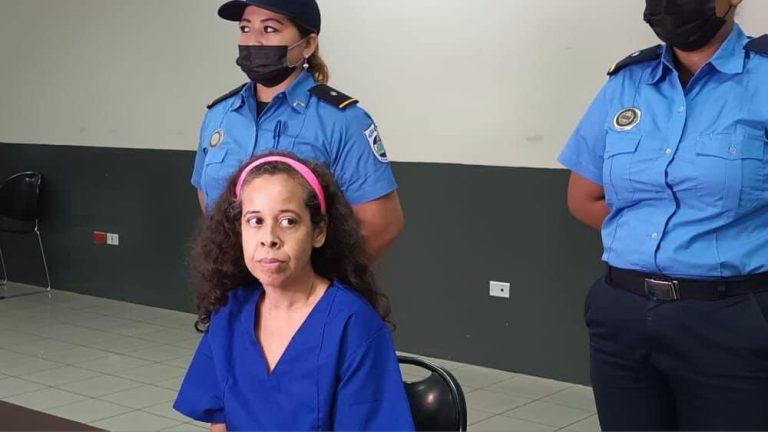2 de septiembre 2022

The Return of the Military

PUBLICIDAD 1M
PUBLICIDAD 4D
PUBLICIDAD 5D
Now Ortega must open the jails to the CIDH and the UN Human Rights Office, so they can supervise the release of all the political prisoners

On Wednesday, August 31, the dictatorship of Daniel Ortega presented political prisoners Dora Maria Tellez, Ana Margarita Vijil, Tamara Davila and Suyen Barahona for the first time, after 444 days of isolation in solitary confinement cells. The four prisoners were all members of the now-outlawed UNAMOS opposition party.
These female prisoners of conscience were displayed to the official media as part of a supposed “informative legal hearing.” They were not accompanied by a defense lawyer, nor were they granted their right to speak.
As part of the same session, a group of male prisoners of conscience were also presented: Felix Maradiaga, Roger Reyes, Juan Lorenzo Holmann, Luis Rivas Anduray, Alvaro Vargas and Irving Larios.
The previous day other political prisoners appeared before the same Magistrate, Octavio Rothschuh, who presides over the Managua Appeals Court. This time, the political prisoners were Juan Sebastian Chamorro, Miguel Mora, Medardo Mairena, Lesther Aleman, Max Jerez, Michael Healy, Marcos Fletes, Walter Gomez, Pedro Vazquez, and Jose Antonio Peraza.
The regime continues to keep other El Chipote prisoners hidden, including Violeta Granera, Miguel Mendoza, Maria Oviedo, Pedro Mena, Freddy Navas, Yader Parajon and Alex Hernandez, plus the four Catholic priests and three seminary students. Further, what we did see wasn’t really a judicial hearing but a “proof of life” presented by the kidnappers who have jailed all Nicaragua. Daniel Ortega and Rosario Murillo displayed the political prisoners only after months of their relatives’ denunciations of the starvation diet, isolation and cruel treatment that prevails in the El Chipote cells, conditions that caused the death of retired General and political captive Hugo Torres last February.
From the kidnappers, we witnessed an exhibition of cowardice and cruelty, presenting the public prisoners of conscience who were pale and gaunt, their weight loss visible. These prisoners have been vilified by the official press, despite the fact that all are innocent, and they’ve been denied their right to a defense.
From the side of the political prisoners, though, we witnessed a lesson in courage and valor. These individuals, who’ve been subjected to torture for over a year, stood before their tormentors with their dignity intact.
The prisoners who were candidates were excluded from the November 2021 electoral competition, and for more than a year the regime has attempted to silence them in the jail cells of El Chipote. They’ve tried to erase them from the national memory by blocking the publication of photos, audio messages or videos of the prisoners. They went so far as to forbid them any contact with their young children and teens. But the mere publication of these government photos, and the dignity that radiates from the political prisoners, symbolizes the moral fiasco of the Ortega-Murillo dictatorship. The pictures impact has raised morale.
The supposed purpose of the “hearing” Magistrate Rothschuh presided over was to comply with a formality and warn the prisoners that – despite their appeals processes – their guilty verdicts will be upheld, and they’ll receive a firm sentence from the Supreme Court.
Nonetheless, the political prisoners continue representing the hopes for change in Nicaragua. They’re all innocent and, as such, their sham trials must be annulled, so they can recover their full freedom and political rights.
Meanwhile, the regime must immediately suspend the torture and isolation in the cells of El Chipote and allow the entry of representatives of the Inter-American Commission for Human Rights and the UN’s Commission of Independent Experts.
Like the criminal mafias, the kidnappers have merely shown us a “proof of life” of the victims they’re holding captive. The next step is for Ortega and Murillo to allow the international human rights commissions entry into the jails, so they can verify the condition of the political prisoners and negotiate their unconditional freedom, in order to begin reestablishing the freedom of all the Nicaraguans.
This article was originally published in Spanish in Confidencial and translated by Havana Times
Archivado como:
PUBLICIDAD 3M
Periodista nicaragüense, exiliado en Costa Rica. Fundador y director de Confidencial y Esta Semana. Miembro del Consejo Rector de la Fundación Gabo. Ha sido Knight Fellow en la Universidad de Stanford (1997-1998) y profesor visitante en la Maestría de Periodismo de la Universidad de Berkeley, California (1998-1999). En mayo 2009, obtuvo el Premio a la Libertad de Expresión en Iberoamérica, de Casa América Cataluña (España). En octubre de 2010 recibió el Premio Maria Moors Cabot de la Escuela de Periodismo de la Universidad de Columbia en Nueva York. En 2021 obtuvo el Premio Ortega y Gasset por su trayectoria periodística.
PUBLICIDAD 3D